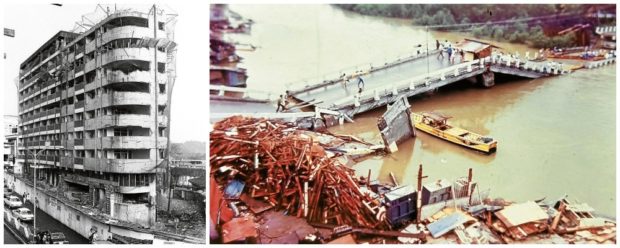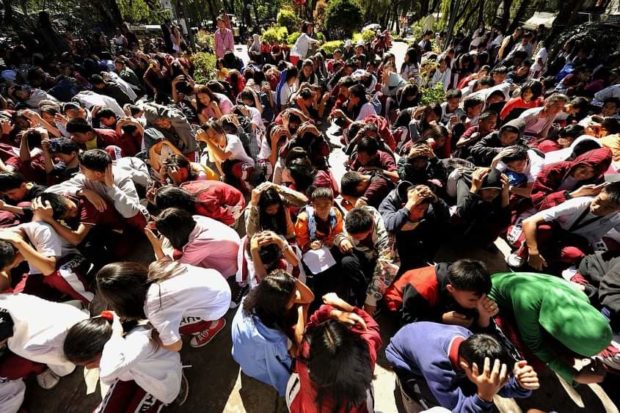Grim memory of 1990 Luzon quake stays with survivor

DEVASTATION The collapsed Hyatt Terraces Baguio is arguably the most powerful image to capture the devastation wrought by the 7.8-magnitude earthquake that rocked northern Luzon on July 16, 1990. —INQUIRER PHOTO
CALASIAO, Pangasinan, Philippines — It took only two minutes for the world to break down around Roman Valdez, now 59, one of the survivors of the 7.8-magnitude earthquake that turned many parts of Baguio City in shambles at 4:26 p.m. on July 16, 1990.
Valdez was at the “Kaili” banquet hall of the Hyatt Terraces Baguio when the earthquake rocked northern Luzon, devastating the summer capital and the cities of Dagupan and Cabanatuan.
To the rest of the country, photographs and video footage of the 12-story Hyatt Terraces collapsing under its own weight like an accordion defined the tragedy that killed almost 2,000 people in Baguio and Cabanatuan, toppled buildings such as Cabanatuan’s Christian College of the Philippines, and sank buildings in Dagupan City when the temblor triggered soil liquefaction.
On the 31st year since the earthquake struck, no memorial was scheduled in any of these cities.
Baguio stopped all commemorative programs after 2013 because of lingering trauma and fears suffered by its residents, although the quake largely shaped the city’s land use policies. The local government is reviewing a comprehensive land use plan that sets an average ceiling of six stories for buildings in most parts of the city but grants exemptions for earthquake-resistant structures.
Mayor Benjamin Magalong on Friday asked the people of Baguio to remember the important lessons that emerged out of the disaster.
“The 1990 earthquake experience should serve as a guidepost on giving premium to disaster preparedness and environment preservation,” Magalong said in a statement.
He said the quake should also serve as an “inspiration on rising from any ruin that life will deal us.”
‘Earth moved up, down’
For a generation of Filipinos who neither experienced the 1990 earthquake nor learned the lessons it imparted, stories like that of Valdez’s may not have drawn as much attention.
But for Valdez, now head of the food and beverage department at the four-star Monarch Hotel in Calasiao, Pangasinan, the memory can be as vivid as the day it happened.
Minutes before the temblor struck, Valdez said he was at the Hyatt Apartelle, waiting for the banquet manager whose office was at the hotel’s second floor.
“It was my day off but he called me to report because some delegates to a seminar at the Nevada Hotel were billeted at the Hyatt,” Valdez recalled in a recent interview with the Inquirer.
Like Hyatt Baguio, the Nevada Hotel, which was then hosting a seminar sponsored by the United States Agency for International Development, was also struck down by the quake.

HEAVYDAMAGE The Skyworld condominium on Session Road in Baguio City (left) and Magsaysay Bridge in Dagupan City (right) were among the buildings and structures heavily damaged by the Luzon earthquake 31 years ago. —EV ESPIRITU AND PHOTO REPRODUCTION FROM THE COLLECTION OF JCI DAGUPANINC.
Valdez said he got bored waiting so he proceeded to the main building “to talk to the other waiters at the banquet hall.”
“I was standing near a cabinet where the dinnerware sets were stored when the earth started to move up and down, then it swayed from side to side. I had experienced earthquakes, which took only seconds, so I expected the shaking to stop,” he said.
“But it got stronger by the second and the walls and ceiling began to wobble. I ran to the kitchen where the employees’ entrance was located. But as I stepped in, the kitchen floor broke in the middle and four workers fell through the crack. They did not survive,” Valdez said.
Various accounts placed the Hyatt fatalities at 80, composed of guests and staff.
Alive
But Hyatt was also where three hotel employees were pulled out alive after rescuers gave up hope.
Luisa Mallorca, a casino employee, and Arnel Calabia, a hotel security guard, were saved after 11 days while cook Pedrito Dy was found alive beneath the debris after 14 days.
Valdez remembered dashing toward the front lobby, and down an escalator that was no longer working. He broke through a glass wall while dodging debris from the crumbling ceiling.
“If you have watched an Indiana Jones movie, it was like that. Your mind is blank but the instinct to survive is strong,” Valdez said.
“There was rain, a thunderstorm, that afternoon, and it was pitch black. But I finally got out of the building,” he added.

SAFETY DRILL Earthquake safety drills have become part of activities of schools in Baguio City to ensure that students and residents are ready once another temblor strikes. —EV ESPIRITU
He considered himself blessed, having been near the hotel lobby when the earthquake struck. “Had I stayed at the apartelle for a few minutes more, l would have been a goner. You would not be talking to me now,” he said.
Eerie sight
The following morning, Valdez saw the collapsed Hyatt, which he described as an “eerie sight.”
Cadets of the Philippine Military Academy (PMA) were sent out to help with the rescue, he remembered. PMA historians are collating accounts of the tragedy to complete records about the cadets’ role in rescue and retrieval operations in 1990.
But Valdez said the task was overwhelming for a city totally unprepared for that degree of devastation.
“There was a 9-year-old girl in a room with her yaya (nanny). She was the daughter of a hotel employee. Her body and that of her yaya, who was hugging her, were found 10 days later,” he said.
Those trapped inside the main hotel had to wait for weeks to be rescued, Valdez said, citing Dy, a bodybuilding aficionado who was at the Hyatt gymnasium when it collapsed.

LUCKY TO BE ALIVE Roman Valdez considers himself lucky for surviving the collapse of the Hyatt Terraces Baguio. —YOLANDA SOTELO
Dy had a build similar to actor and former California governor Arnold Schwarzenegger, Valdez said, but was reed thin, “like the late [Filipino] comedian Palito,” when the cook was pulled out two weeks later.
“But [Dy] was alive, so we were very happy,” Valdez said.
The hotel employees stayed in tents at “Ating Tahanan,” the Girl Scouts of the Philippines compound, in front of Hyatt.
Nightmares
By that time, all roads leading to Baguio had been rendered impassable due to heavy damage and landslides, leaving the city isolated. Like many people, Valdez walked for hours through the 46-kilometer Naguilian Road that linked Baguio to the town of Bauang in La Union province where tricycles were available, so he could go home to his family in San Fabian, Pangasinan.
What he went through and witnessed during the earthquake gave him nightmares, Valdez said. He would wake up drenched in sweat for the next five years.
“I saw heavy walls crashing on me in my dreams. I saw my dead colleagues,” he said.
But he had not sought professional counseling and therapy to address his trauma. “I don’t think [there was] anyone of us [who] did. What was important was to find a job so we could feed our families,” he said.
But the Hyatt chain of hotels in other countries offered survivors jobs so Valdez moved to Saipan for a few years before landing the Monarch assignment.
“It is true that time can heal all wounds,” he said, although the memory of the earthquake and its devastation could sometimes be very vivid, “as if it was only yesterday.”